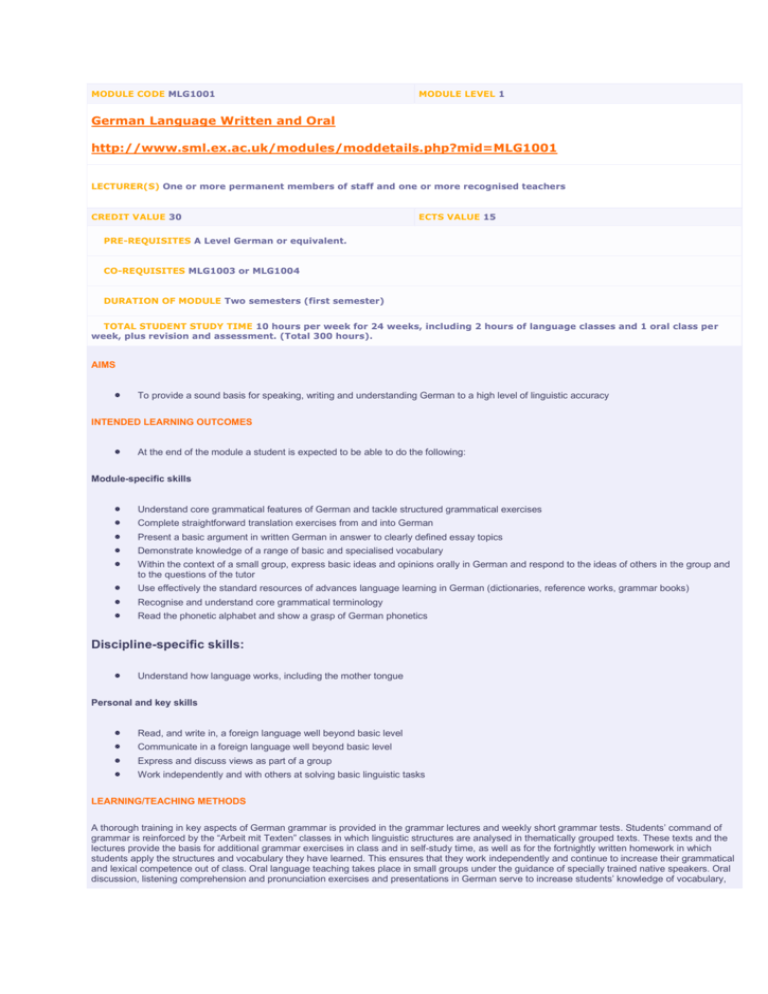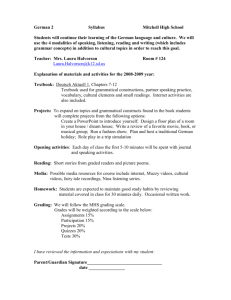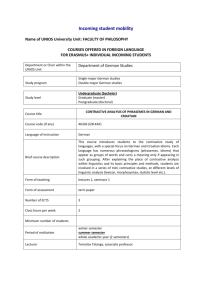German Language
advertisement

MODULE CODE MLG1001 MODULE LEVEL 1 German Language Written and Oral http://www.sml.ex.ac.uk/modules/moddetails.php?mid=MLG1001 LECTURER(S) One or more permanent members of staff and one or more recognised teachers CREDIT VALUE 30 ECTS VALUE 15 PRE-REQUISITES A Level German or equivalent. CO-REQUISITES MLG1003 or MLG1004 DURATION OF MODULE Two semesters (first semester) TOTAL STUDENT STUDY TIME 10 hours per week for 24 weeks, including 2 hours of language classes and 1 oral class per week, plus revision and assessment. (Total 300 hours). AIMS To provide a sound basis for speaking, writing and understanding German to a high level of linguistic accuracy INTENDED LEARNING OUTCOMES At the end of the module a student is expected to be able to do the following: Module-specific skills Understand core grammatical features of German and tackle structured grammatical exercises Complete straightforward translation exercises from and into German Present a basic argument in written German in answer to clearly defined essay topics Demonstrate knowledge of a range of basic and specialised vocabulary Within the context of a small group, express basic ideas and opinions orally in German and respond to the ideas of others in the group and to the questions of the tutor Use effectively the standard resources of advances language learning in German (dictionaries, reference works, grammar books) Recognise and understand core grammatical terminology Read the phonetic alphabet and show a grasp of German phonetics Discipline-specific skills: Understand how language works, including the mother tongue Personal and key skills Read, and write in, a foreign language well beyond basic level Communicate in a foreign language well beyond basic level Express and discuss views as part of a group Work independently and with others at solving basic linguistic tasks LEARNING/TEACHING METHODS A thorough training in key aspects of German grammar is provided in the grammar lectures and weekly short grammar tests. Students’ command of grammar is reinforced by the “Arbeit mit Texten” classes in which linguistic structures are analysed in thematically grouped texts. These texts and the lectures provide the basis for additional grammar exercises in class and in self-study time, as well as for the fortnightly written homework in which students apply the structures and vocabulary they have learned. This ensures that they work independently and continue to increase their grammatical and lexical competence out of class. Oral language teaching takes place in small groups under the guidance of specially trained native speakers. Oral discussion, listening comprehension and pronunciation exercises and presentations in German serve to increase students’ knowledge of vocabulary, aural understanding, handling of German syntax and overall confidence in spoken German. ASSIGNMENTS Weekly grammar tests, fortnightly written work including translation from and into German and essay-writing in German, as well as oral assignments. ASSESSMENT Two 50-minute tests in Semester 1 and one three-hour examination in Semester 2, testing vocabulary, grammar, translation from and into German, and essay-writing in German; written and oral coursework; two aural comprehension tests. SYLLABUS PLAN Semester 1 Study skills: working with a dictionary, grammatical terminology, phonetic alphabet and German phonetics. Grammar: Genders and plural forms of nouns; the case system; articles and their equivalents; verb forms and tenses; the German predicate or ‘verbal idea’; adjective endings; prepositions and their cases; the idiomatic use of prepositions; clauses and co-ordinating / subordinating conjunctions. Arbeit mit Texten: Texts on German and Austrian geography and recent demoscopic developments; German and Austrian twentieth-century history; the economic restructuring and political division of Germany 1945-49 and beyond; the Berlin Blockade; the post-war situation in Vienna. Oral: Introducing oneself; pronunciation exercises; listening comprehension exercises; discussion of historical and contemporary topics; forms of arguing and contradicting; presentations; discussion of project work (linking with MLG 1004). Semester 2 Grammar: Weak masculine and mixed declension nouns; adjectival nouns; personal pronouns and possessives; relative pronouns and relative clauses; interrogative clauses; the passive; German dative usage; conditional clauses; modal verbs (indicative and subjunctive); irregular verbs; separable and non-separable verbs. Arbeit mit Texten: Texts on the GDR; Austria 1955-1983; Germany from the 1950s to the 1980s; the ‘Economic Miracle’; politicians (Bruno Kreisky, Konrad Adenauer, Willy Brandt); speeches / pamphlets on more recent issues. Oral: German syntax (especially inversion); the rhythm and intonation of the German sentence; reciting learnt passages; discussion of historical and contemporary topics; listening comprehension exercises; presentations; discussion of project work (linking with MLG 1004). INDICATIVE BASIC READING LIST Deutsche Grammatik: Erklärungen und Übungen (manual produced by the Department) Deutsche und österreichische Geschichte nach 1945: Texte und Aufgaben (manual produced by the Department) Collins German-English, English-German Dictionary (latest edition)






